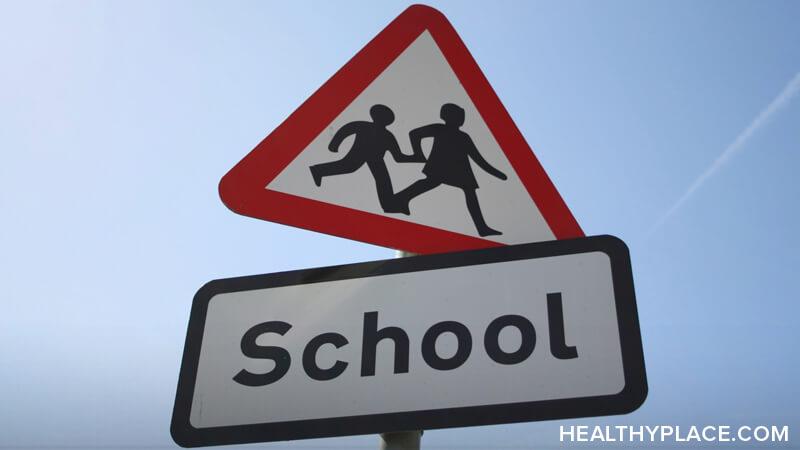Childhood Bullying Affects Us as Adults

Childhood bullying caused me to have a fairly miserable time at school. I was bookish, physically inept and socially awkward. Add to that the headgear and a built-up shoe, and you had a sight that would make any school bully drool.
Last week my oldest daughter started preschool, and I had to deal with the realization that my experiences at school had created a more lasting effect than I would like to admit. Our school years are brief, but the memories they produce stay with us, and it is our responsibility as adults to ensure that our own personal trauma does not negatively impact our children and their experience of education.
Childhood Bullying Is Traumatic
I was a geek before "geek chic" was a thing. There was nothing charming about my particular brand of nerdiness -- I was a brooding know-it-all and much happier between the pages of a book than between friends. I was also privately dealing with undiagnosed obsessive-compulsive disorder (OCD) and depression. The net result was that I was not well-liked, and other kids would often take an instant dislike to me, meaning I was bullied until about age 16.
As a grown-up, I have a small but wonderful and diverse group of friends, and yet whenever I meet new people, particularly in a group, I assume that they won't like me. I assume they will think I'm weird, unattractive and useless. In other words, I return to the playground.
Childhood Bullying Can Affect Adult Relationships
Since becoming a mother three years ago, I have spent a good chunk of time immersed in the world of "mummy and baby groups" (insofar as COVID restrictions have allowed). As much as I have loved watching my daughters explore new things, meet new people and make new friends, the prospect of every new group or class has left me paralyzed with fear -- fear that the other mums won't like me.
I have walked into church halls literally shaking with terror, prepared for the alpha mums to instantly pick me out as the weak link, the weirdo. The one whose kid still isn't sleeping through the night; the only one not using cloth diapers; the one who doesn't fit in with the clique. These fears have been largely unfounded (although "competitive mothering" is not fiction, and I intend to talk about it in a future blog post), but the fears won't go away, and they are now threatening to affect my oldest daughter as she takes her first steps into the world that left me so scarred.
My oldest girl started preschool last week. After three years with her either in my arms, on my lap or by my side, I thought she would find the separation traumatic. It turns out I was wrong. She has taken to the change like a duck to water. The only problem is me.
After her first day came the obvious interrogation: "Did you have fun?" "Did you eat?" "Was everybody kind?"
There was particular emphasis on that last question, with me dissecting every interaction she recounted, looking for any clue that she was being bullied. At three years old. I know every parent worries about their child making friends and enjoying their time at school, but I am so anxious about her having the same school experience as me that I am filled with dread every time I wave her off at the door. I desperately don't want to project my worries onto her, but I know that nothing will change until I change the way I approach meeting new people as a grown-up.
Project Confidence to Treat Social Anxiety from Childhood Bullying
So, I have decided to try something: instead of going into every new social situation assuming that people will dislike me, I am going to assume that everyone will love me. I am going to project the confidence of a three-year-old who has only ever been told that she is wonderful and assume that everybody wants to be my friend.
I tried out this method yesterday when I took my youngest to a new baby massage group, and it worked. It turns out people are naturally drawn to a warm smile and an enthusiastic, friendly demeanor (Who knew?), and I left that session feeling more confident than I had in a long time. And now, I have a strategy for dealing with my own social anxiety. I am hopeful that I will be better equipped to support my daughter on her school journey.
Childhood bullying leaves its mark. I realized at 31 that I had allowed my own experience of bullying to shape the way I approach meeting new people as an adult and that this was threatening to affect my children in their future friendships. Ironically, the way I learned to stop myself from becoming my 12-year-old self in new social situations was to regress even further -- to my toddler years -- and to treat every new person not as a potential bully, but a potential friend.
It might sound juvenile, but it has hugely eased my personal anxieties, and I am hopeful that it will help me to ensure my daughters grow up confident, kind, and happy.
APA Reference
Lear, J.
(2021, April 29). Childhood Bullying Affects Us as Adults, HealthyPlace. Retrieved
on 2026, January 25 from https://www.healthyplace.com/blogs/copingwithdepression/2021/4/childhood-bullying-affects-us-as-adults
Author: Jennifer Lear
Wonderful that "instead of being anxious, don't be anxious!" works for you. However, if it was that easy everyone would be doing it.
If it were only that easy... I agree. To alleviate anxiety, you have to have coping skills or a list of things (a toolbox, so to speak) that help you retake control of your brain. This, then, hopefully, lessens the anxiety so you can work your way through whatever it is that has triggered your fear more healthily.
